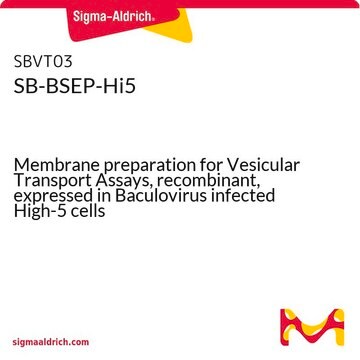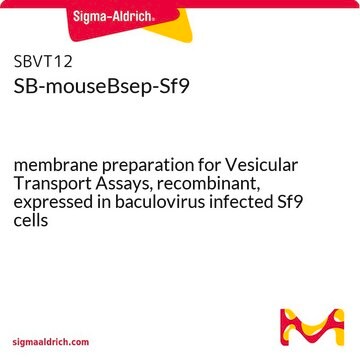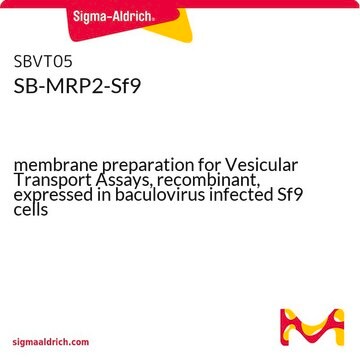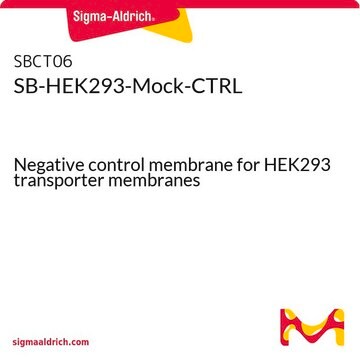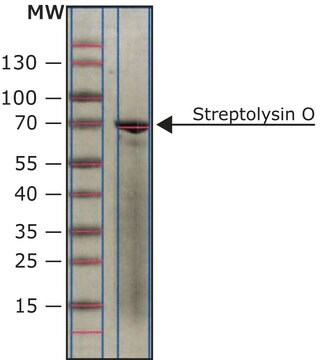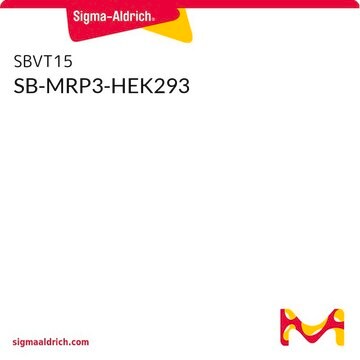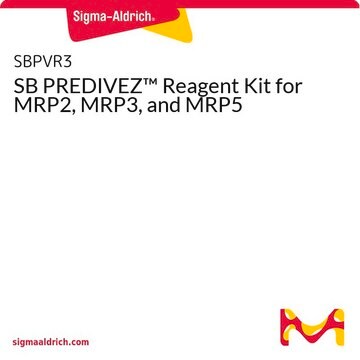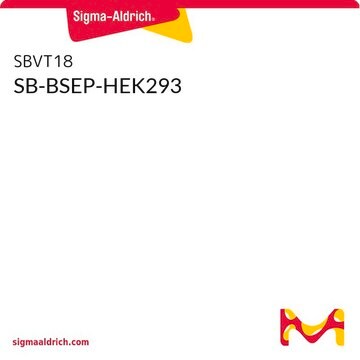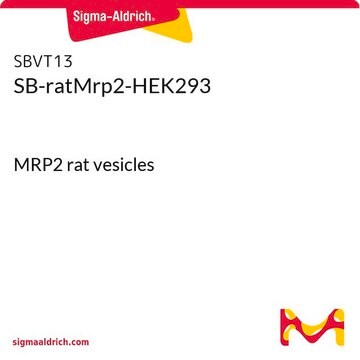おすすめの製品
リコンビナント
expressed in baculovirus infected Sf9 cells
フォーム
liquid
濃度
5 mg/mL
色
off-white
UniProtアクセッション番号
輸送温度
dry ice
保管温度
−70°C
遺伝子情報
human ... ABCC3(8714)
詳細
Membrane Preparations for Vesicular Transport Assays (VT) are suitable for general drug-efflux transporter interaction studies. Both substrate and inhibitor interactions can be assessed using vesicles. The success of substrate interaction studies strongly depends on the passive permeability of the compound. High permeability substrates might not be detected. Control Membranes with no-, or significantly lower transporter activity are also available.
アプリケーション
In the vesicular transport assay so-called "inside-out" membrane vesicles containing ABC transporters are applied. Incubating substrates of the respective efflux transporter in the presence of the inverted membrane vesicles and ATP will allow measuring accumulation of the substrates into the vesicles. In many cases radiolabeled reporter substrates are used but recently SOLVO developed the new PREDIVEZ Vesicular Transport Kits that use fluorescent reporter substrates.
The standard vesicular transport assay is an inhibitory assay performed with cold test articles. This assay provides information on any interaction between the ABC transporter and the test article. The transport of the reporter substrate is measured in the presence of the test article (typically in 7 concentrations) and IC50 is defined as the concentration inhibiting the transport of the reporter substrate by 50%.
Should radiolabeled form of the investigated compound or adequate analytical methods (LC/MS, HPLC) be available, the vesicular transport assay may be performed in a direct format without the reporter substrate and may identify substrate nature of the test article. The vesicular transport substrate assay is a low throughput assay. It is suitable for low permeability test compounds as high permeability compounds may escape from the vesicles through the lipid bilayer.
PREDIVEZ vesicular transport kit is sold separately. This transporter membrane vesicle assay requires the PREDIVEZ vesicular transport kit and corresponding control membrane below:
SB PREDIVEZ Reagent Kit for MRP2, MRP3, and MRP5 part number SBPVR3-9RXN and corresponding control membrane SB-beta-gal-Sf9-CTRL part number SBCT03-1EA
The standard vesicular transport assay is an inhibitory assay performed with cold test articles. This assay provides information on any interaction between the ABC transporter and the test article. The transport of the reporter substrate is measured in the presence of the test article (typically in 7 concentrations) and IC50 is defined as the concentration inhibiting the transport of the reporter substrate by 50%.
Should radiolabeled form of the investigated compound or adequate analytical methods (LC/MS, HPLC) be available, the vesicular transport assay may be performed in a direct format without the reporter substrate and may identify substrate nature of the test article. The vesicular transport substrate assay is a low throughput assay. It is suitable for low permeability test compounds as high permeability compounds may escape from the vesicles through the lipid bilayer.
PREDIVEZ vesicular transport kit is sold separately. This transporter membrane vesicle assay requires the PREDIVEZ vesicular transport kit and corresponding control membrane below:
SB PREDIVEZ Reagent Kit for MRP2, MRP3, and MRP5 part number SBPVR3-9RXN and corresponding control membrane SB-beta-gal-Sf9-CTRL part number SBCT03-1EA
物理的形状
Supplied as frozen membrane vesicles, containing 5 mg/ml membrane protein, labeled with volume, catalog number (transporter) and date of production.
法的情報
SOLVO Biotechnology, Inc.より提供。
保管分類コード
12 - Non Combustible Liquids
WGK
WGK 1
引火点(°F)
Not applicable
引火点(℃)
Not applicable
適用法令
試験研究用途を考慮した関連法令を主に挙げております。化学物質以外については、一部の情報のみ提供しています。 製品を安全かつ合法的に使用することは、使用者の義務です。最新情報により修正される場合があります。WEBの反映には時間を要することがあるため、適宜SDSをご参照ください。
カルタヘナ法
カルタヘナ法
Jan Code
SBVT06-1EA:
最新バージョンのいずれかを選択してください:
Laura Partanen et al.
Genes, chromosomes & cancer, 51(9), 832-840 (2012-05-16)
The ATP-binding cassette (ABC) of active transporters comprises a group of proteins that which facilitate efflux of anticancer drugs from cancer cells. We focused on the gene amplification and protein expression of ABCC3 (also known as MRP3) in breast cancer
M Kool et al.
Proceedings of the National Academy of Sciences of the United States of America, 96(12), 6914-6919 (1999-06-09)
The human multidrug-resistance protein (MRP) gene family contains at least six members: MRP1, encoding the multidrug-resistance protein; MRP2 or cMOAT, encoding the canalicular multispecific organic anion transporter; and four homologs, called MRP3, MRP4, MRP5, and MRP6. In this report, we
D F Ortiz et al.
The American journal of physiology, 276(6 Pt 1), G1493-G1500 (1999-06-11)
Bile secretion in liver is driven in large part by ATP-binding cassette (ABC)-type proteins that reside in the canalicular membrane and effect ATP-dependent transport of bile acids, phospholipids, and non-bile acid organic anions. Canalicular ABC-type proteins can be classified into
T Hirohashi et al.
The Journal of pharmacology and experimental therapeutics, 292(1), 265-270 (1999-12-22)
Several organic anions are actively extruded from intestinal epithelial cells into the lumen and vascular sides. To examine the role of the multidrug resistance-associated protein (MRP) family in the intestinal efflux of organic anions, the function and expression of these
Koen van de Wetering et al.
Gastroenterology, 137(5), 1725-1735 (2009-07-07)
The physiologic function of the efflux transporter Multidrug Resistance Protein 3 (MRP3) remains poorly defined. In vitro, MRP3 transports several glucuronidated compounds, but the compounds transported under physiologic conditions are unknown. Knowledge of the compounds transported by MRP3 in vivo
ライフサイエンス、有機合成、材料科学、クロマトグラフィー、分析など、あらゆる分野の研究に経験のあるメンバーがおります。.
製品に関するお問い合わせはこちら(テクニカルサービス)
